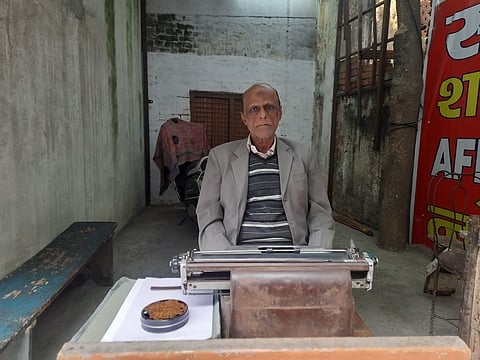
Meerut: Many local languages are losing relevance due to the dominance of Hindi and English in the nation. However, Urdu, despite its usage in numerous communities and its influence on Hindi sentences, is experiencing a gradual decline. The Mooknayak in Meerut spoke to the last Urdu translator at the district court, Mohammad Naeem Ansari, who, armed with an old typewriter, is dedicatedly preserving his work and legacy.
Ansari recounted his humble beginnings in the profession, stating, “I have been working since 1971. Initially, many colleagues worked alongside me, but now it's just me. Some have retired, enjoying a slow and serene life, while others have passed away.”
Reflecting on the changes observed over the decades, Ansari remarked, “The business is not the same anymore. Some days I have no work, while other days, the workload is substantial. Today, for example, I translated only one document the entire day. Interestingly, the workload has increased compared to yesteryears. This is because these days, very few people know how to read and write in Urdu. Lawyers, policemen, and even most families are unfamiliar with the language. To make old documents readable for the masses, they are mostly translated into Hindi.”
Reminiscing about his childhood, Ansari shared his personal journey with Urdu, “I studied in an Urdu medium school, encouraged by my family. My elder brother teaches the language, and I learned a few things from him. However, my experiences as a translator clarified many important nuances.”
“My kids have learned Urdu, but they are not as proficient as me or my generation,” Ansari added.
According to the translator, studies related to the old language have changed. He noted, “Urdu is no longer taught or encouraged in institutions. Initially, there were Urdu translators in educational institutions, but due to ideological differences, governments have removed them. Unfortunately, the fate of many languages depends more on governing parties than on the people. Some individuals still pursue research in Urdu literature, but the numbers are dwindling compared to mainstream languages.”
Asserting the importance of his work, Ansari stated, “Even if mass conversions of records happen, the importance of the language in offices will not diminish. The main documents will still be in Urdu. Patwari and Tehsildar’s records are still in the language, necessitating oral translations. Some records cannot be released to the public, making oral translations an ongoing necessity. This ensures the continued relevance of my work.”
Discussing teaching his children the language, Ansari said, “They learned Urdu in school but have minimal knowledge and proficiency. We need to study Urdu with the same enthusiasm prevalent in the past. Urdu was never meant for only one community.”
Ansari mentioned cultural events in the state, such as Meerut’s Nauchandi Mela and events organized by Chaudhury Charan Singh University, promoting diversity among languages.
Urdu, with speakers spread across the country, traditionally found a stronghold in North India, especially Uttar Pradesh. However, 2011 census data indicates a decline in Urdu speakers to less than 4.2%, despite overall population growth.
This decline contrasts with previous census data, showing a positive trend. In 1971, there were 2.86 crore Urdu speakers, growing to over 3.5 crore in 1981, 4.4 crore in 1991, and 5.15 crore in 2001. However, in 2011, the figure slightly decreased to 5.07 crore.
In the 2001 census, Urdu ranked sixth among the most spoken languages but slipped to seventh place in 2011, surpassed by Gujarati. This shift highlights the evolving linguistic landscape in India.
Also Read-
You can also join our WhatsApp group to get premium and selected news of The Mooknayak on WhatsApp. Click here to join the WhatsApp group.